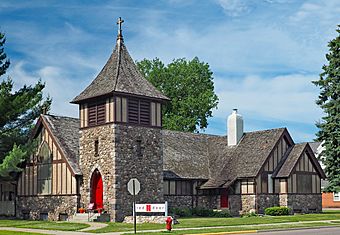Church of Our Savior (Little Falls, Minnesota) facts for kids
Quick facts for kids |
|
|
Church of Our Savior--Episcopal
|
|

Church of Our Savior from the northeast
|
|
| Location | 113 4th Street NE, Little Falls, Minnesota |
|---|---|
| Area | less than one acre |
| Built | 1903 |
| Built by | Louis Triplett |
| Architect | John Lutcliff |
| NRHP reference No. | 80002090 |
| Added to NRHP | July 17, 1980 |
The Episcopal Church of Our Savior is a beautiful old church located at 113 4th Street NE in Little Falls, Minnesota. It's a very important building because of its history and unique design. People have been gathering here for worship since the mid-1800s.
Contents
A Look at Its History
The church's story began around 1858. At that time, Bishop Henry Whipple started a missionary effort in the area. This led to the first church building being constructed. Later, a second church was built in 1869.
The Current Building
The church building you see today was finished in 1903. It was designed by a talented architect named John B. Sutcliffe from Chicago. A local builder, Louis Triplett, was in charge of constructing it. This building is known for its interesting mix of styles.
Blending Old Styles
The Church of Our Savior combines two classic architectural styles: Gothic and Tudor. The lower parts of the walls and the foundation are made from strong fieldstone. The upper sections of the walls have a special look called half-timbered, with stucco filling the spaces.
Unique Tower Design
One of the church's cool features is its corner tower. It's also built from fieldstone. On top of the tower, there's a bell tower with a roof that flares out and is covered in shingles. It gives the church a very distinct appearance.
A Recognized Landmark
The Church of Our Savior is so special that it was added to the National Register of Historic Places on July 17, 1980. This list includes important places across the United States.
Why It's Historic
Being on the National Register means the church is a great example of its kind. It shows how Episcopal churches were built in Minnesota in the early 1900s. Its design reminds people of old English churches. It's different from some of the earlier churches built by Bishop Whipple. This church truly stands out as a well-preserved piece of history.



